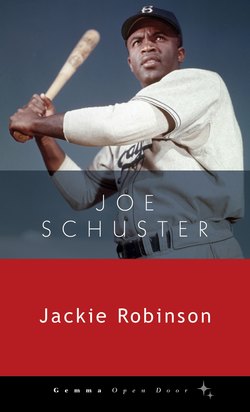Читать книгу Jackie Robinson - Joe Schuster - Страница 5
На сайте Литреса книга снята с продажи.
Оглавление1.
Against the Klan
Jackie Robinson was in a fight with the Ku Klux Klan almost three months before his best baseball season ever. The Klan was angry because Jackie’s team, the Brooklyn Dodgers, agreed to play three exhibition games in Georgia against the Atlanta Crackers.
Klan leader Samuel Green said Jackie and his teammate Roy Campanella could not play in the games because they were African Americans. He said it was illegal for black players and white players to appear on the field together in Georgia. Green said he would make sure that Jackie and Campanella were not in the games.
This kind of reaction to Jackie was not new to him during his career. He broke baseball’s color line when the Dodgers signed him to a contract three years before. The color line kept all but white ballplayers from playing in the major leagues for many years.
After they signed Jackie, the Dodgers sent him to play for their minor league team in Montreal in 1946 to teach him how to compete in professional baseball. They made this decision because there was less bias against black people in Canada than in the United States. But the Montreal Royals held spring training in Florida. There, Jackie faced great prejudice.
On his trip to Florida from his home in California with his wife, Rachel, he had to change planes in New Orleans. There the Robinsons saw the effect of Jim Crow laws that states in the American South enforced. Jim Crow was a character created by a white singer more than 100 years before Jackie joined the Dodgers. The singer painted his face black and made fun of the language and songs of slaves to entertain white audiences. After the United States outlawed slavery, some states passed laws to keep African Americans as second-class citizens. They named those laws after Jim Crow.
Once the Robinsons were in the South, they were not allowed to eat in the airport coffee shop. They saw signs for whites-only bathrooms and drinking fountains. The airline sold too many tickets for their flight to Florida and gave the Robinsons’ seats to white passengers. Jackie took a sixteen hour bus ride for the last part of his trip. Because of Jim Crow laws, the Robinsons sat in uncomfortable seats at the back of the bus even though there were comfortable empty seats in the white section.
When Jackie arrived at spring training, he could not stay in the nice hotel with his white teammates. He boarded with black families in the city. He could not change into his uniform in the team clubhouse with the other players. Instead, he changed at home.
The bias against Jackie even affected him on the field. When it was time for the Royals’ first exhibition game in Jacksonville that spring, the city said that “Negroes and whites cannot compete against each other on a city-owned playground.” His team canceled the game. When they tried to play another one, the city canceled it. Other cities in Florida decided to keep the team from playing games if Jackie was on the field.
Even though he faced this bias Jackie had a good season with Montreal. He was the best hitter in the league. The next year, the Dodgers decided that he was good enough to play in the major leagues. The team trained in Cuba and Panama, where they were safe from Jim Crow laws. In 1948, they trained in the Dominican Republic for the same reason. Then the team bought land in Vero Beach, Florida, so that the team could train and play exhibition games but not have to follow most Jim Crow laws.
Because other major league teams trained in Florida cities that still opposed black players competing with white players, the Dodgers played most of their exhibition games in other states.
By 1949, Jackie and the Dodgers were even more tired of the effect of Jim Crow laws. In January, the team announced their plan to play exhibition games in Florida and other states in the American South. They said that Jackie and Campanella would play in those games. If any city or state tried to prevent them, they would cancel the games. They said this meant the city and state would lose out on the money those games might bring them.
Almost right away, cities in Florida and North Carolina said they would let them play. In Georgia it was a different story, especially in Atlanta.
Atlanta was the home base of the Ku Klux Klan, then and now one of the most active groups in the world who oppose rights for people who are not white. Georgia governor Eugene Talmadge had campaigned for his office by calling for racial segregation.
The stage was set for an important fight about race in baseball and America.
